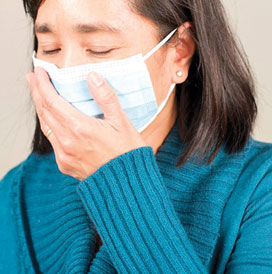Don't panic
It's just the flu:
by Dhaneshi Yatawara
The flu outbreak in the country affecting mainly children, is nothing
to panic about. Medical experts said, people having the flu should wear
surgical masks to prevent spreading the flu bug."All flu cases are not
necessarily influenza. It can be just a simple flu,"
 Dr. Ananda Amarasinghe, Consultant Epidemiologist of the Health
Ministry's Epidemiology Unit said, "There is no need to panic about the
current flu wave, though many children have already been affected". Dr. Ananda Amarasinghe, Consultant Epidemiologist of the Health
Ministry's Epidemiology Unit said, "There is no need to panic about the
current flu wave, though many children have already been affected".
"Wearing a mask will not only minimise the spread of the disease but
also safeguard the patient's health too," he said.
The present flu outbreak can be prevented from spreading by adopting
simple steps. There is no need to close schools and pre-schools due to
the outbreak. For any respiratory tract infection, precautionary
measures are necessary, said Dr. Amarasinghe, to control infection.
"The infection spreads when a person sneezes or coughs. But the virus
cannot travel a long distance, in the air. Only people in close contact
with an infected person are likely to be affected. A handkerchief or a
tissue must be used to cover the mouth when coughing or sneezing," he
said.
Good hygiene
The next step is to constantly wash the hands as they carry the bug,
because while sneezing the hands come in close contact with the mouth.
"If infected people go to work or attend public places, there is no harm
but precaution should be taken," he said.
Although there were cases of Influenza A and B in Sri Lanka, a
majority of the reported cases at present are of the simple viral 'flu.
"Not a single case of H1N1 'flu has been reported in the first quarter
of 2015.
"Each year, there are peak times with various types of flu affecting
the people, specially through January, February and March, but this is
not a consistent trend either," he said.
For any viral infections, the best remedy is rest.
"There is no specific drug for viral infections, so it is best to
take ample liquids, ensure a balanced diet and take proper rest," said
Dr. Amarasinghe, adding that sound rest will help speed up the recovery
process.
However, a dangerous trend has arisen where Influenza A has reached
pandemic proportions, with the disease spreading from one continent to
another.
Among the most known pandemics was the 1917 - 1918 Spanish 'flu. The
recent most was the 2009 Influenza A H1N1.
Influenza A variants are sometimes named according to the host or
carrier species in which the strain is endemic or to which it has
adapted.
Several main variants have been named in the world as, Bird flu,
Human flu, Swine influenza, Equine influenza and Canine influenza. The
current 'flu has not shown any signs of developing into a pandemic.
"With constant testing and research, it has been found that the
current outbreak was just a seasonal 'flu," said Dr. Amarasinghe.
Panic situation
The respiratory reference laboratory at the National Influenza Centre
of the Medical Research Institute conducts tests on Influenza viruses,
using the globally adopted tests such as the rt-PCR test (Realtime
polymerase chain reaction test) on persons infected with the flu.
Despite medical advice several schools have begun to panic over children
continuously getting affected by the 'flu.
Some school authorities have requested parents not to send their
children to school if affected by the flu and ensure that they get ample
rest.
In the Colombo District, many schools and pre-schools sent the
children back home, when they were detected with flu symptoms. Lexicon
International School in Kurunegala faced a similar flu outbreak last
month, said Senior Deputy Principal, Mala Dharmaratne.
"Many children were absent during March but now things are getting
back to normal," she said.
In Colombo, the American pre-school also had a few cases reported,
according to Director, Ramona Pulle.
"Since many students of the pre-Kindergarten section fell sick, we
took precautionary measures. We even had morning health checks before
allowing children into their classrooms," she said.
"Sometimes, parents did not co-operate, when they were informed that
their chidlren had runny noses and got into arguments with the staff.
We asked parents not to send children to school if they had a fever
or a cold, because it spreads fast among children," she said. |

